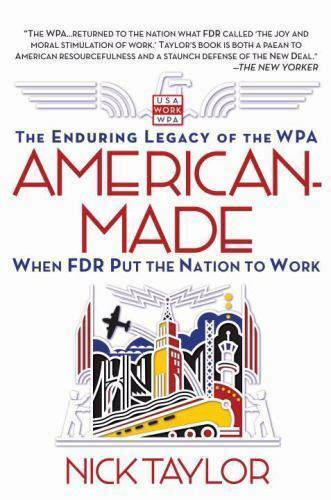by Nick Taylor
You’d think the the U.S. Chamber of Commerce would put itself on the side of the fight against COVID-19. But it doesn’t change its stripes. Even with the country facing a level of disaster unseen since the Great Depression, the Chamber of Commerce stands against an effective fight against the coronavirus. It sided with corporate over central decision-making about how to produce scarce protective gear and speed it to health workers where it’s needed most. It did the same kind of thing during the Great Depression when it opposed the creation of the Works Progress Administration (WPA).
This time around it let Washington and the White House know it opposes a government move to invoke the Defense Product Act (DPA). The Korean War-era law allows the government to order the production of wartime supplies. In this case, the supplies are gloves and masks, other protective coverings, and disinfecting wipes, the war is the war against coronavirus, and the troops are the nurses and doctors and intake workers on the front lines. Every model of the path of the pandemic suggests the number of patients sickened by the virus will explode in the near weeks ahead, and the workers at most risk will need every protection they can get.
New York City, California, and Washington State are seeing the most cases, and will have the greatest need. But there’s no coordination of either the production of the needed equipment or delivering it to where it needs to be.
On March 20, 2020, a chamber news release said it supported a study of the need to invoke the DPA. Neil Bradley, Executive Vice President and Chief Policy officer of the chamber, said, “We have insufficient stockpiles of medical countermeasures and other critical products, but we must avoid domestic production mandates that could inadvertently reduce supplies of critical products in the short term. While the administration is working closely with industry to address immediate needs, we need a firmer analysis before proceeding with the reported domestic production executive order that could be counterproductive. Further, such moves could deprive vibrant U.S. companies of access to international markets and inputs in a way that could undermine economic recovery,”
President Trump said he didn’t need to use the Defense Production Act because companies are already working with the government to make and deliver the medical supplies. The chamber told The New York Times that corporate executives were working “hand in glove” with the government.
New York Governor Andrew Cuomo painted a more dire picture to Wolf Blitzer on CNN. He said, “They [the federal government] should take over the acquisition of all the medical supplies. You hear all day long about how people are running out of masks and PPE and protective gear, ventilators, et cetera. We now have a situation where every state on its own is trying to acquire these goods, and, Wolf, we’re actually competing against each other. So we find a mask manufacturer, I’m trying to contract with them, California’s trying to contract with them, Texas is trying to contract with them. Masks that we paid 85 cents for, we’re now paying $7. Okay? Why have all of these states competing against each other to buy the equipment and have hospitals saying, we’re going to close down if we don’t get the equipment? Let the federal government take over that responsibility. A situation like this, you do what you can and everyone does what they do best. Here, the federal government should say, ‘I’ll do all the acquisition, stop competing against each other,’ and then the federal government allocates that equipment, depending on need.”
During the Great Depression, the Chamber of Commerce also chose business over dramatic action in the crisis. President Franklin Roosevelt’s New Deal administration had proposed the Works Progress Administration to put millions of unemployed Americans back to work and rebuild the national infrastructure. Its jobs and pay would not compete with private industry. But the chamber opposed creating the WPA, saying it would be cheaper to write checks to the unemployed than put them to work.
FDR didn’t listen. The WPA’s investment gave the country new roads, bridges, airports and hospitals, and a workforce with the skills to meet the demands of World War II.
Using the Defense Production Act today would be a similar investment, an investment in the brave souls working in the face of the enemy and in the health they need to keep the rest of us safe.
For more on central action in a crisis, read my book American-Made.





